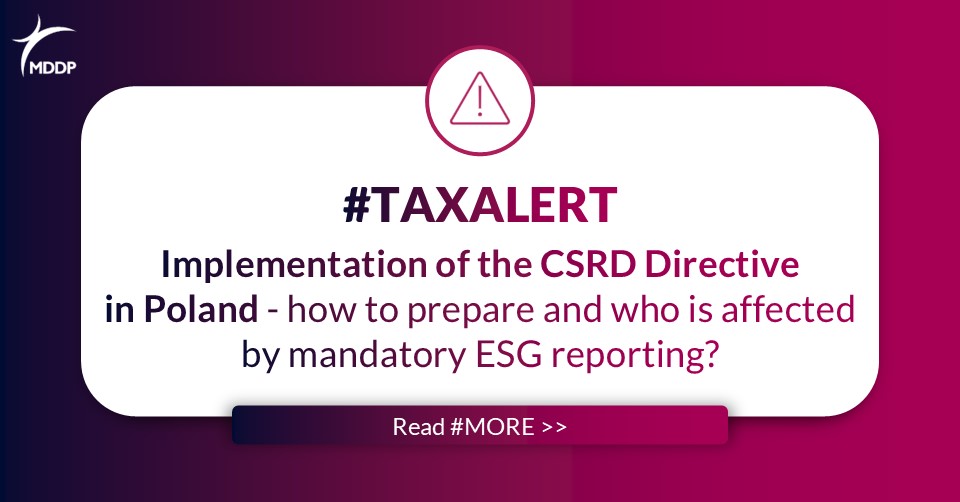Implementation of the CSRD Directive in Poland – find out how to prepare and who is affected by mandatory ESG reporting
On December 13, 2024, the President signed amendments to the Act on Accounting, Statutory Auditors, Audit Firms, and Public Oversight, as well as certain other acts. This means that the Corporate Sustainability Reporting Directive (CSRD) has been implemented into Polish law.
Purpose of the new regulations
The CSRD directive was developed to standardise the process of sustainability reporting. The introduced regulations aim to ensure that published reports are credible, easy to verify, and include more detailed data based on specific principles. Uniform standards will make reports easily comparable.
Scope of application
Sustainability reporting is not a new obligation. According to Article 49b of the Accounting Act, publicly traded companies that meet certain criteria for employment (over 500 employees) and total assets (over PLN 85 million) have been required to prepare non-financial disclosures under the 2014 Non-Financial Reporting Directive (NFRD).
Under the new regulations, these entities will be the first to submit sustainability reports (ESG reporting) covering three key areas: environmental, social, and corporate governance. These reports will apply to fiscal year 2024.
Subsequently, large companies meeting two out of three criteria—more than 250 employees, a balance sheet total exceeding €25 million, and/or annual revenues above €50 million—will be required to submit reports for fiscal year 2025.
The next group affected will be small and medium-sized enterprises (SMEs) listed on regulated markets, such as companies listed on the Warsaw Stock Exchange in Poland. These entities will prepare reports for fiscal year 2026. However, SMEs may opt out of reporting in some areas by providing justification for their decision.
Finally, non-EU companies with at least one branch within the EU and net revenues exceeding €150 million will be required to submit reports.
Reporting standards
The CSRD directive establishes uniform EU reporting standards, known as the European Sustainability Reporting Standards (ESRS). These guidelines specify the framework for data collection and reporting and include:
- General standards: ESRS 1 and ESRS 2.
- Thematic standards: 5 environmental (E1-E5), 4 social (S1-S4), and 1 corporate governance standard (G1).
By 2026, sector-specific standards, such as those for SMEs, will also be published.
Report assurance
The CSRD regulations have been incorporated into the Act on Statutory Auditors, Audit Firms, and Public Oversight, making assurance of reports mandatory for all obligated entities. Certified statutory auditors will verify:
- The double materiality assessment (whether the company conducted the analysis in line with standards and assessed processes).
- Compliance of disclosures with the ESRS.
- Conformity with Regulation (EU) 2020/852 on sustainable investment taxonomy.
- Accuracy in preparing reports in XHTML format and tagging.
Assurance will initially follow national guidelines. However, the European Commission plans to introduce limited assurance standards by 2026 and reasonable assurance standards by 2028.
What does this mean?
The implementation of the CSRD directive marks a significant shift, making sustainability reporting (ESG reporting) a mandatory and routine part of corporate operations. Preparing these reports will pose challenges, including data collection from supply chains and stakeholders, conducting accurate double materiality analyses, ensuring data consistency, and obtaining assurance.
However, the insights gained through this process will allow businesses to better understand their environmental and social impact, enhance their reputation in business relations, and develop future-proof business models and strategies.
In case you are interested in the above information and its impact on your business, please contact:
Joanna Ryś-Bednarczyk | +48 503 973 366 | |
Magdalena Krzemińska | +48 600 448 914 |
or your adviser from MDDP.
This Tax Alert does not provide legal or tax advice. MDDP Michalik Dłuska Dziedzic & Partners spółka doradztwa podatkowego spółka akcyjna is not responsible for the use of the information provided in the Alert without the prior consultation with legal or tax advisers.

